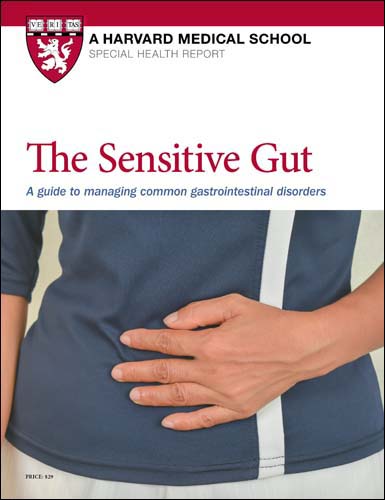Is something in your diet causing diarrhea?
Learn how to identify the foods or ingredients that give you the runs.

As we age, our digestive systems can become more sensitive to certain types of foods and methods of food preparation. While you once may have handled the spiciest of foods without breaking a sweat, now that super-hot chicken curry gives you the digestive drama known as diarrhea—uncomfortable, unformed, watery stool.
Sometimes diarrhea occurs because of an underlying condition, or as a side effect of a medication (see "Other causes of diarrhea"). However, diet is often the cause.
Diarrhea triggers
The following can cause loose stools or make them worse.
Sugar. Sugars stimulate the gut to put out water and electrolytes, which loosen bowel movements. If you ingest a lot of sugar, you may develop diarrhea. One of the biggest offenders is fructose, which is found naturally in fruits (such as peaches, pears, cherries, and apples) or added to foods and drinks, such as applesauce, soda, and juice beverages. Many people who ingest more than 40 to 80 grams of fructose per day will get diarrhea. Another offender: artificial sweeteners such as sorbitol, mannitol, and xylitol (found in sugar-free gum, candy, and medications).
Dairy foods. These contain lactose, which some people have a hard time digesting. Watch out for cheese, milk, and ice cream, among many other products.
FODMAPs. Fructose, artificial sweeteners, and lactose are part a group of poorly digested sugars that can cause diarrhea, known as FODMAPs (fermentable oligosaccharides, disaccharides, monosaccharides, and polyols). Other sources of FODMAPs include wheat, rye, onions, garlic, legumes (chickpeas, lentils, beans), honey, pistachios, cashews, asparagus, and artichokes.
Gluten. Gluten is a protein found in wheat, barley, rye, beer, and even salad dressings. People who are gluten-sensitive may have a hard time digesting gluten and get diarrhea as a result. In people with celiac disease, ingesting gluten provokes the body to attack the lining of the small intestine, which can cause serious damage.
Fried or fatty foods. Some people have a hard time digesting creamy or fried foods. When fatty foods are not absorbed normally, they go to the colon, where they are broken down to fatty acids, causing the colon to secrete fluid and trigger diarrhea.
Spicy foods. Spicy sauces may mask high fat content, especially in Tex-Mex dishes or curries. And there's this unpleasant side effect: If you eat a lot of hot spicy foods, you may get burning in the rectum.
Caffeine. Caffeine speeds up the digestive system. It's found in coffee, tea, chocolate, many sodas, and foods flavored with coffee or chocolate.
The fix
Identify the foods and drinks that seem to trigger your diarrhea. Keeping a food journal is a great start, and so is seeing your doctor to make sure something else isn't responsible for your symptoms.
If food is the culprit, following a FODMAP-free diet will often get rid of diarrhea in a week or two. Be-cause many FODMAP foods such as fruits and vegetables are good for health, it's best to work with a dietitian to develop a FODMAP-free menu that includes other healthy foods.
Get help
Chronic diarrhea can interfere with your life, at home and at work. Even if it is not severe, its unpredictability and urgency can make you reluctant to socialize. And some people hesitate to bring the problem to a doctor's attention because they think it's not serious, or because it's embarrassing. But anyone with chronic diarrhea should contact a doctor, particularly if there are other warning signs, such as low appetite or weight loss. The causes and cures for chronic diarrhea are complex. So, if changing your diet hasn't resolved the problem, don't try to figure it out on your own.
Other causes of diarrheaIn older adults, diarrhea often turns out to be a side effect of medication. Things like antibiotics and anti-gout medications can cause diarrhea by altering movement in the gut and the bacterial population in our intestines. Other causes include:
|
Image: 5432action/Getty Images
Disclaimer:
As a service to our readers, Harvard Health Publishing provides access to our library of archived content. Please note the date of last review or update on all articles.
No content on this site, regardless of date, should ever be used as a substitute for direct medical advice from your doctor or other qualified clinician.
















